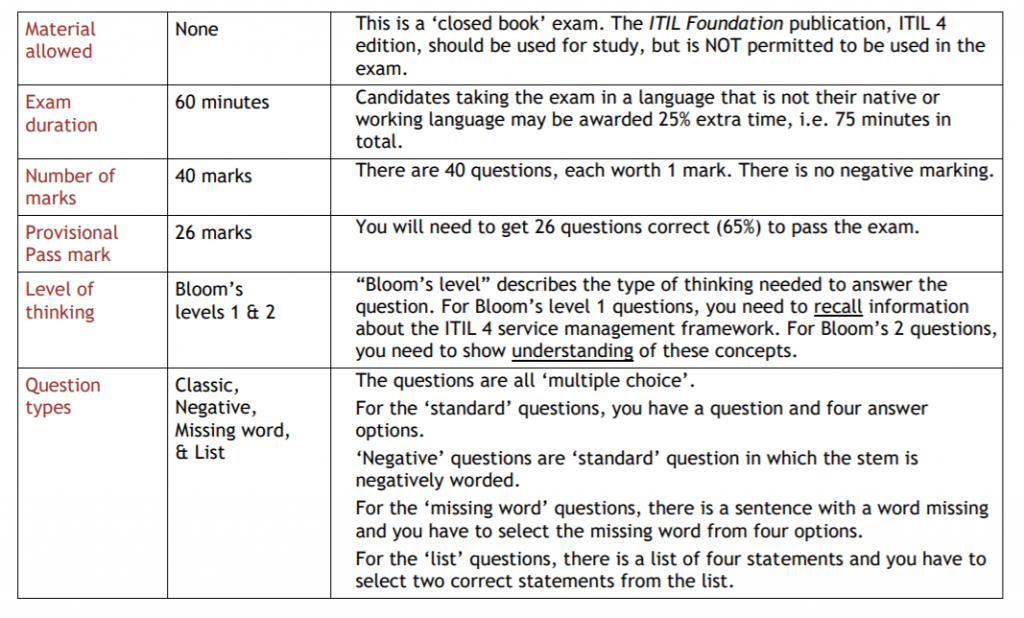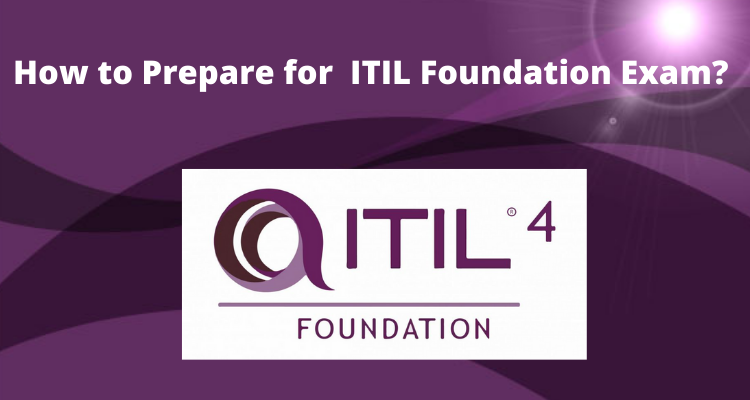The ITIL Foundation certification is an essential qualification for IT professionals who want to excel in their careers. The certification provides a comprehensive understanding of IT service management and the best practices that are used in the industry. This is made to help professionals learn what they need to manage IT services well and make their organization work better.
Getting ready for the ITIL Foundation exam might seem hard, especially if you’re new to IT service management. But if you use the right stuff and methods, you can get ready well and pass easily. In this blog, we’ll walk you through the preparation steps. We’ll give you advice on how to study, what materials to use, and how to tackle the exam. So, whether you’re a seasoned IT professional or just starting out, this blog will provide you with everything you need to know to succeed in the ITIL Foundation exam.
Glossary for ITIL Foundation Terminology
Here are some common ITIL Foundation terminology and their definitions:
- ITIL (Information Technology Infrastructure Library): A framework for managing and giving IT services better.
- Service Management: A collection of special skills within an organization to give customers valuable services.
- Service: A way to give customers what they want without them having to deal with certain costs and risks.
- Incident: An unexpected stoppage or a drop in the quality of an IT service.
- Problem: The underlying cause of one or more incidents.
- Change: The addition, modification, or removal of anything that could have an effect on IT services.
- Service Desk: A single point of contact for users to report incidents, request services, and seek help.
- Service Level Agreement (SLA): An agreement between a service provider and a customer that defines the level of service to be provided.
- Configuration Item (CI): An individual component of an IT infrastructure that is managed as part of a configuration management system.
- Continual Service Improvement (CSI): A stage in the ITIL service lifecycle that focuses on improving services on an ongoing basis.
Exam preparation resources for ITIL Foundation Exam
Here are some of the most popular and effective resources that you can use to prepare for the ITIL Foundation Exam:
- ITIL Foundation Certification Study Guide by AXELOS:
- This guide includes everything from the ITIL Foundation syllabus. It’s made by the folks who created ITIL and has clear explanations, examples, and practice questions to get you ready for the exam. You can buy it on the AXELOS website or Amazon.
- ITIL Foundation Exam Study Guide by Sybex: This study guide is another popular resource for preparing for the ITIL Foundation Exam. It covers all the topics that are included in the syllabus and provides practice questions, exam tips, and study aids to help you pass the exam. You can purchase this book on the Sybex website or on Amazon.
- ITIL Foundation Exam Online Course by ITProTV: This online course provides video lectures, practice exams, and study aids to help you prepare for the ITIL Foundation Exam. It is a self-paced course, so you can study at your own pace and on your own schedule. You can enroll in this course on the ITProTV website.
- ITIL Foundation Exam Practice Tests by Udemy: This course provides practice tests that simulate the actual ITIL Foundation Exam. There are more than 400 practice questions in this course, along with clear explanations to help you know the right answers. You can sign up for this class on Udemy’s website.
- ITIL Foundation Exam Sample Questions by Axelos: This resource provides a set of sample questions that are similar to the ones you will encounter on the ITIL Foundation Exam. It includes both multiple-choice and scenario-based questions, and it provides detailed explanations of the correct answers. You can access these sample questions on the AXELOS website.
Expert tips to pass the ITIL Foundation Exam
- Familiarize yourself with the ITIL framework: Make sure you have a good understanding of the ITIL framework and its key concepts, processes, and functions. Review the official ITIL Foundation study guide, attend an ITIL training course, or watch online tutorials to gain a solid foundation.
- Practice with sample exams: Practice makes perfect. Look for practice ITIL Foundation tests and try answering the questions to understand how the real exam’s questions look and what kind they are.
- Pay attention to keywords: Pay close attention to the keywords used in the exam questions. Words like “must”, “should”, and “could” can indicate different levels of importance or priority. Make sure you understand the implications of each word in the context of the question.
- Focus on the core concepts: While it’s important to have a broad understanding of the ITIL framework, it’s also important to focus on the core concepts that are covered in the Foundation exam. These include service management, the service lifecycle, and key processes such as incident management, problem management, and change management.
- Use mind maps and diagrams: ITIL Foundation covers a lot of information, so it’s helpful to use mind maps and diagrams to help you visualize and organize the information. This can help you understand the relationships between different concepts and processes.
- Manage your time: The ITIL Foundation test has a time limit, so it’s crucial to use your time wisely. Keep a steady pace during the exam and save some time to double-check your answers before you finish and turn it in.
- Read the questions carefully: Take your time to read each question carefully and make sure you understand what is being asked before answering. Don’t rush through the exam and don’t make assumptions.
- Eliminate incorrect answers: If you’re unsure of an answer, try to eliminate the incorrect options first. This can help you narrow down your choices and increase your chances of choosing the correct answer.
- Keep calm and focused: The ITIL Foundation exam can be stressful, but it’s important to stay calm and focused. Take deep breaths and remember that you have prepared well.
- Review your results: After you’ve completed the exam, review your results to see which areas you need to improve on. This can help you prepare for future ITIL exams and improve your overall understanding of the ITIL framework.
An Overview of ITIL Foundation Examination (Version 4)
Axelos keeps adding new parts to the latest ITIL version called ITIL 4, which came out in February 2019. They’ve also recently added the ITIL 4 Managing Professional Transition Module. It offers different ways for professionals with different levels of experience to get certified.
The ITIL 4 Foundation certification is like a starting point to learn about ITIL 4. It helps you understand how IT service management works from start to finish. This includes making, delivering, and making tech-based products and services better.
The ITIL certification can is useful for the various candidates-
- Firstly, those candidates who lack a basic understanding of the ITIL framework
- Secondly, those candidates who desire to understand how ITIL can be utilised to intensify IT service management
- Also, the IT professionals or others working candidates within an organization that have adopted ITIL.
Basic Exam Details
The exam consists of 40 multiple-choice questions. And, the candidate must complete the ITIL examination within 60 minutes. In addition, candidates must achieve 65% and above to qualify the same. Also, view the table below for more information.

Concepts of ITIL Exam
One must also have a brief about the ITIL concepts. ITIL has certain key principles that form the five core components. Some key concepts/principles of ITIL are listed below-
- Delivering maximum value to customers
- Optimizing resources and capabilities
- Offering services that are useful and reliable
- Planning processes with specific goals in mind
- Defining roles clearly for each task.
Important Key Terms of ITIL
Important Key terms are a must to acknowledge while preparing for the ITIL certifications. These are as follows-
- Capabilities
The functional skills or abilities an association pertains to resources in order to create value.
- Functions
Self-contained subsets of an association designed to achieve specific tasks. They normally take the form of a group of people and the tools they use.
- Processes
Structured sets of activities meant to accomplish a specific objective. The four basic characteristics of processes are:
- Firstly, they transform inputs into outputs
- Secondly, they deliver results to a specific customer or stakeholder
- Thirdly, they are measurable
- Also, they are triggered by specific events
- Resources
The raw materials that add to a service, such as money, equipment, time and staff.
- Roles
Defined collections of responsibilities and privileges. Roles may be held by individuals or teams.
- Service Assets
Additionally known just like assets, these indicate to the resources and capabilities that a service provider must designate to offer a service.
- Service Management
Specialized capabilities for presenting value to customers in the form of services.
- Services
A way to give customers something valuable without making them deal with certain expenses and risks.
- Value, Utility, and Warranty
The value of the service comprises of two particluars: utility and warranty. Services must propose both utility and warranty to have value.
ITIL Foundation Test Questions Format
The questions are all ‘multiple-choice’. You can also view the sample questions below.

ITIL Syllabus
The syllabus is the most crucial part of any certification. One must be acquainted with the syllabus, before venturing on to preparation.
The table below shows what the ITIL exam checks and where you can find these topics in the manual. The book references point to the section mentioned, but not the subsections within that section unless mentioned. The action word for each assessment tells you the Bloom’s level (BL): ‘Recall’/’Define’ means Level 1, basic remembering and recognizing, ‘Describe’/’Explain’ means Level 2, understanding and grasping.


A comprehensive Study Guide For ITIL Exam 
Understanding ITIL Exam Concepts is overcritical, but it’s also vital to understand the ITIL Exam pattern so that you’ll feel completely confident. Therefore, we have come up this step by step preparatory guide. Following this ITIL Foundation Exam Study Guide, the way it is will help you excel.
Do the background check
When we say to do your background check, we want you to review each and every objective. Further, this includes every exam detail, keep updated with the exam syllabus. Don’t forget to do your homework before you begin with your preparation. This will ensure that you are also on the same page as the ITIL exam.
Download the candidate Guide Book
Your next step should include downloading the guide book which is simply available on the AXELOS official website. Once, you download the study guide, you’ll have the full exposure to each and every exam details. Not to mention, you’ll have the exam syllabus with all the listing included. This will ensure that you are preparing for the exam keeping in mind every topic and subtopic.
Enrol in Online Course
Now, remember this is a certification exam, not a high school exam which you can pass studying one night before. You will definitely be requiring some help. So, make sure to enrol yourself in an ITIL Foundation Course for the same. This will ensure that you are making time for your preparation every day. And, it will confirm that you’re regular in your studies.
You may also find an online course that includes video training as well. The internet is filled with so many online courses, so make sure to find one which suits you the best.
Find Study Notes
We all are familiar with the study notes. In the same vein, find study notes online. This will help you in understanding the concept even better. Make sure to first make a list of all the key concepts and term. And, later you can easily view various study notes accordingly.
Join a Community
After going through your study notes and online course, there have to be some doubts. Therefore, make sure to join a community or an online forum where you can clear your doubt. With so many candidates going on the same journey as yours, you’ll be able to connect with them easily. In such cases, you help others too. Further, this will lead to enhancements of your own skills.
Practice your way through
Practising is the key to qualifying any certification exam and ITIL is no different. So, make sure to practise as much as you can. If you wish to find some ITIL Foundation Practice Exam, then here you go.
Also, keep in mind to always go through your wrong answers too. This will you a room to think where you’re lacking. For more practice sets, CLICK HERE.
Tips and Tricks to hit the goal! 
In addition to the study materials, it’s important to be strategic in your approach. That’s why we’re sharing some helpful tips and strategies to help you achieve your goals. Make sure you study in a way that’s both effective and smart.
- First of all, a little reminder practice as much as you can. Because take it from expert’s there nothing that can troubleshoot your career without practising.
- Always make sure that you are studying on a regular basis. And, that there are no breaks in between. Remember, constancy is the key here.
- Work professionally and go through your weaknesses. Since this will determine your success.
- While going through your online training course, make sure to make your own study notes. This will be helpful later while revising.
- If you feel alom=ne, then find a study buddy for yourself and work as a team.
Expert’s Corner 
First, take a moment to relax and breathe. It might seem like a lot, but don’t lose your confidence. Take it one step at a time. The preparation guide we mentioned has a lot to offer. Getting ready for a certification exam doesn’t have to be tough if you’re prepared to get ready. So, focus on turning your weak points into strengths, and you’ll surely pass your ITIL exam. Follow our advice and go through this preparation guide – you’ll be grateful later.

Tilt the scales in your favour with advanced learning skills and expert tutorials on ITIL Foundation 4 Exam.


